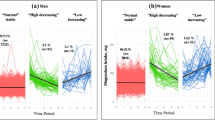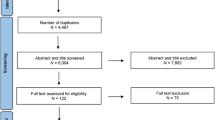Abstract
Objective
Alzheimer patients (AD) are known to be at risk for malnutrition and their older spouses may also have nutritional problems. The aim of our study was to clarify the association of caregivers' sex on the nutrient intake of AD couples.
Setting
Our study uses the baseline data of a randomized nutritional trial exploring the effectiveness of nutrition intervention among home-dwelling AD patients.
Participants
The central AD register in Finland was used to recruit AD patients living with a spousal caregiver, 99 couples participated in our study.
Measurements
Nutritional status was assessed using the Mini-Nutritional Assessment (MNA). Nutrient intakes for both AD patients and their spouses were calculated from 3-day food diaries.
Results
The mean age of caregivers and AD spouses was 75.2 (SD 7.0) and 77.4 years (SD 5.6), respectively. According to the MNA, 40% of male and 52% of female AD spouses were at risk for malnutrition. Among male caregivers, the mean energy and protein intakes were 1605 kcal (SD 458) and 0.93g/body kg (SD 0.30), whereas the respective figures for their female AD spouses were 1313 kcal (SD 340) and 0.86 g/body kg (SD 0.32), respectively. Among female caregivers, the mean energy and protein intakes were 1536 kcal (SD 402) and 1.00 g/body kg (SD 0.30), whereas the respective figures for their male AD spouses were 1897 kcal (SD 416) and 1.04 g/body kg (SD 0.30). The interaction between male caregiver sex and lower energy (p<0.001) and lower protein intake (p=0.0048) (adjusted for age and MMSE) was significant. Similar differences between caregiver sexes were observed with the intake of various nutrients.
Conclusions
A gender difference exists in the ability to cope with caregiver responsibilities related to nutrition. A need exists for tailored nutritional guidance among older individuals and especially among male caregivers.
Similar content being viewed by others
References
Guigoz Y. The Mini Nutritional assessment (MNA®) review of the literature — what does it tell us? J Nutr Health Aging 2006;10:466–485.
Gillette Guyonnet S, Abellan Van Kan G, Alix E, Andrieu S, Belmin J, Berrut G. International Academy on Nutrition and Aging (IANA) Expert Group: weight loss and Alzheimer’s disease. J Nutr Health Aging 2007;11:38–48.
Shatenstein B, Kergoat MJ, Reid I. Poor nutrient intakes during 1-year follow-up with community-dwelling older adults with early-stage Alzheimer dementia compared to cognitively intact matched controls. J Am Diet Assoc 2007;107:2091–2099.
Rogue M, Salva A, Vellas B. Malnutrition in community-dwelling adults with dementia (Nutrialz trial). J Nutr Health Aging 2013;4:295–299.
Lesourd B. Nutritional factors and immunological ageing. Proc Nutr Soc 2006;65:319–325.
Wardwell L, Chapman-Novakofski K, Herrel S, Woods J. Nutrient intakes and immune function of elderly subjects. J Am Diet Assoc 2008;108:2005–2012.
Morley JE, Argiles JM, Evans JW et al. Nutritional recommendations for the management of sarcopenia. J Am Med Dir Assoc 2010;11:391–396.
Silva P, Kergoat MJ, Shatenstein B. Challenges in managing the diet of older adults with early-stage Alzheimer dementia: a caregiver perspective. J Nutr Health Aging; 2013;17:142–147.
Rivière S, Gillette-Guyonnet S, Voisin T, Reynish E, Andrieu S, Lauque S, Salva A, Frisoni G, Nourhashemi F, Micas M, Vellas B. A nutritional education program could prevent weight loss and slow cognitive decline in Alzheimer’s disease. J Nutr Health Aging 2001;5:295–299.
Lauque S, Arnaud-Battandier F, Gillette S, Plaze JM, Andrieu S, Cantet C, Vellas B. Improvement of Weight and Fat-Free Mass with Oral Nutritional Supplementation in Patients with Alzheimer’s Disease at Risk of Malnutrition: A Prospective Randomized Study. J Am Geriatr Soc 2004;52:1702–1707.
Milne A, Avenell A, Potter J. Meta-Analysis: Protein and energy supplementation in older people. Ann Intern Med 2006;144:37–48.
Shatenstein B, Kergoat MJ, Reid I, Chicoine ME. Dietary intervention on older adults with early-stage Alzheimer dementia: early lessons learned. J Nutr Health Aging 2008;12:461–469.
Raivio M, Eloniemi-Sulkava U, Laakkonen ML, Saarenheimo M, Pietila M, Tilvis R, Pitkala K. How do offically organized services meet the needs of elderly caregivers and their spouses with Alzheimer’s disease? Am J Alzheimer’s Dis Other Demen 2007;22:360–368.
Johansson L, Sibenvall B, Malmberg L, Christensson L. Who will become malnourished? A prospective study of factors associated with malnutrition in older persons living at home. J Nutr Health Aging 2009;13:855–861.
Torres SJ, McCabe M, Nowson CA. Depression, nutritional risk and eating behaviour in older caregivers. J Nutr Health & Aging 2010;14:442–448.
Foote JA, Giuliano AR, Harris RB. Older adults need guidance to meet Nutritional Recommendations. J Am Coll Nutr 2000;19:628–640.
Volkert D, Kreuel K, Heseker H, Stehle P. Energy and nutrient intake of young-old, old-old and very-old elderly in Germany. Eur J Clin Nutr 2004;58:1190–1200.
Marshall TA, Stumbo PJ, Warren JJ, Xie XJ. Inadequate nutrient intakes are common and associated with low diet variety in rural, community-dwelling elderly. J Nutr 2001;131:2192–2196.
Toffanello ED, Inelmen EM, Minicuci N, Campigotto F, Sergi G, Coin A, Miotto F, Enzi E, Manzato E. Ten-year trends in vitamin intake in free-living healthy elderly people: the risk of subclinical malnutrition. J Nutr Health Aging 2011;2:99–103.
Soini H, Suominen MH, Muurinen S, Strandberg TE, Pitkälä KH. Malnutrition according to the mini nutritional assessment in older adults in different settings. J Am Geriatr Soc 2011;59:765–766.
Vikstedt T, Suominen MH, Joki A, Muurinen S, Soini H, Pitkälä KH. Nutritional status, energy, protein, and micronutrient intake of older service house residents. J Am Med Dir Assoc 2011;12:302–307.
Bates CJ, Prentice A, Finch S. Gender differences in food and nutrient intakes and status indicates from the National Diet and Nutrition Survey of people aged 65 years and over. Eur J Clin Nutr 1999;53:694–699.
Baker & Wardle. Sex differences in fruit and vegetable intake in older adults. Appetite 2003;40:269–275.
Paturi M, Tapanainen H, Reinivuo H, Pietinen P. The national FINDIET 2007 Survey. Kansanterveyslaitoksen julkaisuja B 23/2008.
Hughes G, Bennet KM, Hetherington MM. Old and alone: barriers to healthy eating in older men living on their own. Appetite 2004;43:269–276.
Fjellström C, Starkenberg Å, Wesslen A, Licentiate MS, Tysen Bäckström AC, Faxen-Irving G, The OmegAD study group. To be a good provider: An Exploratory study among spouses of persons with Alzheimer’s disease. Am J Alzeimers Dis Other Demen. 2010;25:521–526.
Jyvakorpi S, Puranen T, Pitkala KH, Suominen MH. Nutritional treatment of aged individuals with alzheimer disease living at home with their spouses — a randomized controlled intervention trial. Trials. 22012;4:13:66.
McKhann G, Drachman D, Folstein M, Katzman R, Price D, Stadlan EM. Clinical diagnosis of Alzheimer’s disease: report of the NINCDS-ADRDA Work Group under the auspices of Department of Health and Human Services Task Force on Alzheimer’s Disease. Neurology 1984;34:939–944.
Charlson ME, Pompei P, Ales KL, MacKenzie CR. A new method of classifying prognostic comorbidity in longitudinal studies: development and validation. J Chronic Dis 1987;40:373–83.
Folstein MF, Folstein SE, Mchugh PR. ”Mini-mental-state”. A practical method for grading the cognitive state of patients for the clinician. J Psychiatr Res 1975;12:189–198.
Guigoz Y, Launque S, Vellas BJ. Identifying the elderly at risk for malnutrition the Mini Nutritional Assessment. Clin Geriatr 2002;18:737–757.
Zarit SH, Reever KE, Bach-Peterson J. Relatives of the impaired elderly: correlates of feelings of burden. Gerontologist 1980;20 649–655.
Lawton MP and Brody EM. Assessment of older people: self-maintaining and instrumental activities of daily living. Gerontologist 1969;9:179–186.
Rastas M, Seppänen R, Knuts LR et al. Ruokien ravintoainesisältö [Nutrient Composition of Foods]. Kansaneläkelaitos, Turku, 1997.
Baker KL & Robertson N. Coping with caring for someone with dementia: reviewing the literature about men. Aging and Mental Health 2008;12:413–422.
Pöysti MM, Laakkonen ML, Strandberg T, Savikko N, Tilvis RS, Eloniemi-Sulkava U, Pitkälä KH. Gender Differences in Dementia spousal caregiving. Int J Alz Dis. 2012;162960.
Gariballa SE & Forster SJ. Dietary intake o folder patients in hospital and at home: The validity of patients kept food diaries. J Nutr Health Aging 2008;12:102–106.
Bilotta C, Bergamaschini L, Arienti R, Spreafico S, Vergani C. Caregiver burden as a short time predictor of weight loss in older outpatients suffering from mild to moderate Alzheimer’s disease: A thee months follow-up study. Aging and mental health 2010;14:481–488
Nordic Council of Ministers. Nordic Nutrition Recommendations. Integrating nutrition and physical activity. Copenhagen, 2004.
Bauer J, Biolo G, Cederholm T, Cesari M, Cruz-Jentoft AJ, Morley JE, Phillips S, Sieber C, Stehle P, Teta D, Visvanathan R, Volpi E, Boirie Y. Evidence-based recommendations for optimal dietary protein intake in older people: a position paper from the PROT-AGE Study Group. J Am Diet Assoc 2013;14:542–559.
Iuliano S, Woods J, Robbins J. Consuming two additional serves of dairy food a day significantly improves energy and nutrient intakes in ambulatory aged care residents: A feasibility study. J Nutr Health Aging 2013;6:509–513.
Roos G, Prättälä R, Koski K. Men, masculinity and food: interviews with Finnish carpentres and engineers. Appetite 2001;27:45–56.
Calasanti T & Bowen E. Spousal caregiving and crossing gender boundaries: Maintaining gendered identities. J Aging Studies 2006;20:253–263.
Raivio M, Eloniemi-Sulkava U, Laakkonen ML, Saarenheimo M, Pietilä M, Tilvis R, Pitkälä K. How do officially organized services meet the needs of elderly caregivers and their spouses with Alzheimer’s disease? Am J Alzheimers Dis Other Demen 2007;22:360–368.
Keller HH, Gibbs A, Wong S, Wanderkooy P, Hedley M. Men can cook! J Nutr Elderly 2004;24:71–84.
Author information
Authors and Affiliations
Corresponding author
Rights and permissions
About this article
Cite this article
Puranen, T.M., Pietila, S.E., Pitkala, K.H. et al. Caregivers’ male gender is associated with poor nutrient intake in AD families (NuAD-trial). J Nutr Health Aging 18, 672–676 (2014). https://doi.org/10.1007/s12603-014-0499-z
Received:
Accepted:
Published:
Issue Date:
DOI: https://doi.org/10.1007/s12603-014-0499-z




